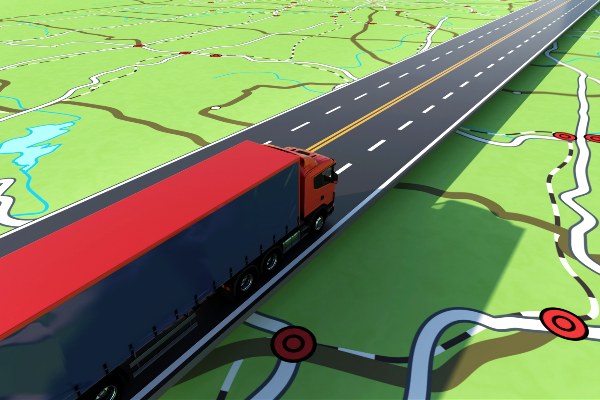In the dynamic world of trucking, GPS tracking stands as a pillar of modernity, steering the industry towards new heights of efficiency and safety. For truck drivers, these devices are indispensable companions that provide real-time data and insights, ensuring every journey is as informed as it is secure.
Let’s delve into the realm of GPS-tracking devices and how they can revolutionize your driving experience.
Understanding GPS Tracking for Trucks
GPS tracking is a satellite-based navigation system that delivers location and time information in all weather conditions, anywhere on or near the Earth. It has become a cornerstone of contemporary logistics, offering a panoramic view of vehicular movement across the globe.
What is GPS Tracking?
At its core, GPS tracking is a satellite-based navigation system that provides location and time information under all weather conditions, anywhere on or near the Earth. It’s a technology that has become integral to modern-day logistics, offering a bird’s-eye view of vehicular movement across the globe.
The Basics of GPS Tracking Devices for Trucks
GPS devices for trucks come in various forms, from basic models that simply track location to advanced systems that offer detailed insights into driver behavior, vehicle health, and more. The key features to look for include real-time GPS fleet tracking, route history, geofencing, alerts, and reporting capabilities.
Benefits of GPS Tracking for Truck Drivers
With GPS tracking, gone are the days of poring over maps and guessing the best routes. These devices provide real-time traffic updates, helping you avoid congestion and reduce idle time, ensuring timely deliveries, and maintaining customer satisfaction.
- Enhanced Route Management
GPS tracking eradicates the need for traditional maps and guesswork, providing real-time traffic updates, helping you avoid congestion, reducing idle time, and ensuring timely deliveries. - Improved Safety and Security
GPS tracking devices act as digital guardians for drivers and their cargo, alerting you to potential vehicle theft, unauthorized use, or deviations from the planned route, and providing crucial location information in emergencies. - Cost Savings and Efficiency
By optimizing routes, GPS tracking devices help reduce fuel consumption and vehicle wear and tear. They also remind you of maintenance schedules, preventing costly repairs and downtime.
Choosing the Right GPS Tracking Device
Selecting a GPS device requires considering its reliability, ease of use, and the specific needs of your operations. Questions about robust reporting, durability, and customer support are vital.
Key Considerations When Selecting a GPS Device
When choosing a GPS device, consider its reliability, user-friendliness, and the specific needs of your operations. Does it offer robust reporting? Can it withstand the rigors of long-haul travel? Is the customer support responsive? These are critical questions to ask.
Installation and Setup
Most GPS devices are straightforward to install, often requiring no more than a connection to the vehicle’s OBD-II port. Setup should be equally simple, with an intuitive interface that allows you to start tracking without a steep learning curve.
Best Practices for Using GPS Tracking Devices
The data your GPS device collects is a goldmine of insights. Learn to read and interpret this information to make informed decisions about your driving patterns, vehicle performance, and maintenance needs.
Data Utilization
The data collected by your GPS device is a treasure trove of insights. Learning to read and interpret this information can inform decisions about driving patterns, vehicle performance, and maintenance needs.
Maintaining Your GPS Device
Proper care for your GPS tracking device is essential. Ensure it’s securely mounted, protected from the elements, and regularly updated to benefit from the latest features and improvements.
Legal and Privacy Concerns
GPS tracking can aid in adhering to Hours of Service regulations, ensuring legal driving limits, and maintaining necessary logs automatically.
Compliance with Regulations
GPS tracking can help you adhere to Hours of Service regulations, ensuring you’re driving within legal limits and maintaining the necessary logs automatically.
Privacy Issues
Balancing data needs with driver privacy is crucial. Transparent policies and clear communication with drivers about data use can help address privacy concerns.
The Future of GPS Tracking in Trucking
The future of GPS tracking in trucking is promising, with advancements like predictive analytics and integration with autonomous driving technologies.
Innovations on the Horizon
The future of GPS tracking in trucking is bright, with advancements like predictive analytics, which can forecast potential issues before they occur, and integration with autonomous driving technologies.
Integrating with Other Technologies
The integration of GPS tracking with other technologies such as telematics is creating smarter, more connected trucks that can communicate with everything from traffic lights to logistic centers, paving the way for a more integrated and intelligent transportation network.
Finally…
GPS tracking devices are pivotal in transforming the trucking industry, offering benefits that extend to all business aspects. They provide a competitive edge in a market that prizes speed, efficiency, and safety.
Embracing GPS technology as a truck driver can mean the difference between just keeping pace and leading the pack. It’s an investment in your business, your safety, and your peace of mind.
Feature photo by Gustavo Fring.











